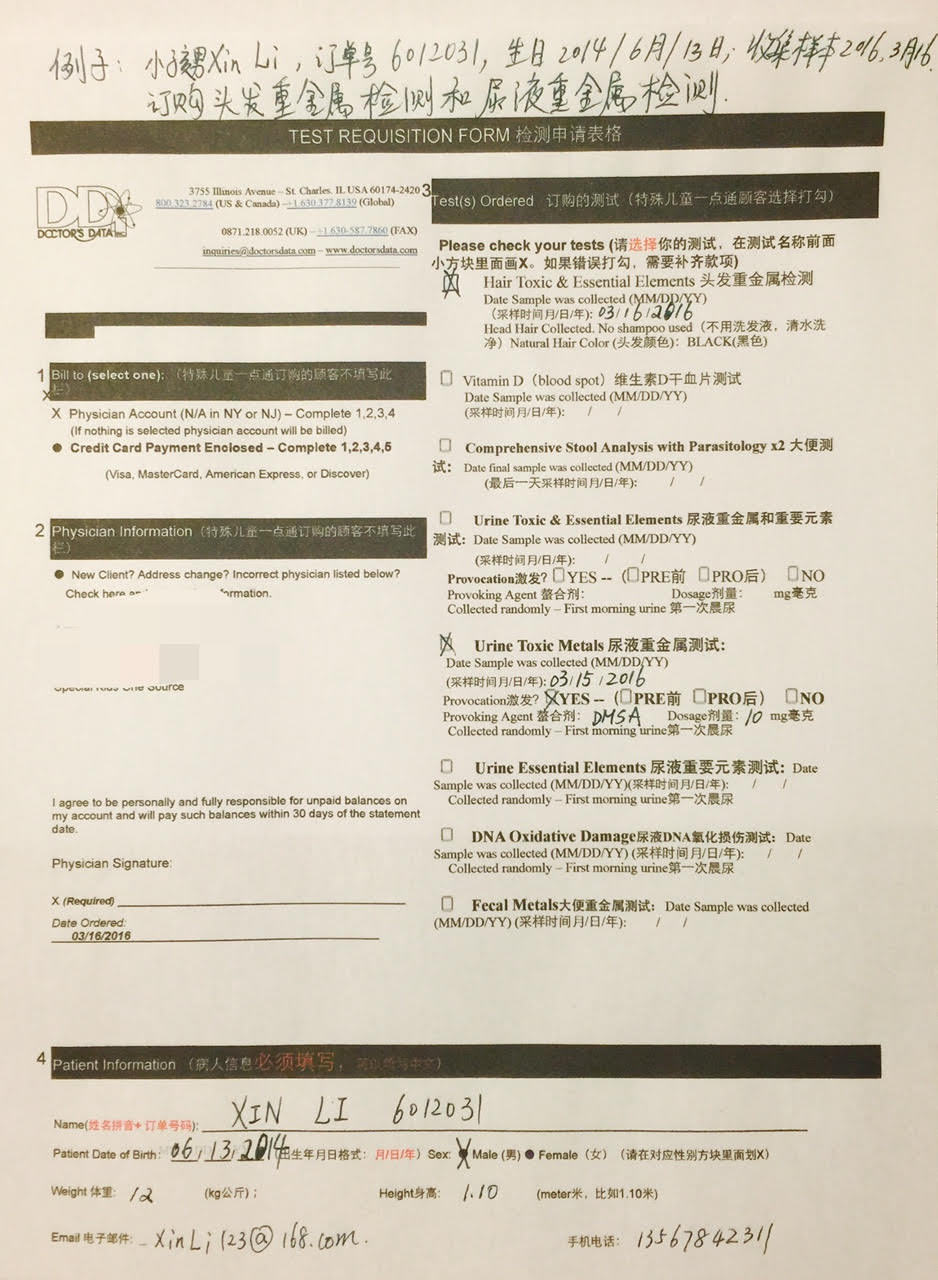这个测试是大平原用的Doctor Data 的,所以就是DDI的标准测试。
收集头发:尽可能剪到靠近头皮的头发, 应从后脑五、六个不同部位收集头发。特别说明:订购了沃勒医生报告分析的,如果拿到了检测报告,需要你按照订单号为主题,把实验室检测结果发到一点通邮箱 specialkidsonesource@gmail.com,我们才会转发沃勒医生进行下一步的医生报告分析。
在收到医生营养报告后实施方案三个月到半年之间,可以考虑复诊。
复诊分如下两种情况:
1、没有重新检测,只想医生根据孩子实施方案后的情况提供调整方案。复诊里面有三个自由问题可以提。可以没有新报告,只是目前情况反馈,问补充剂变化?应该附上上次沃勒的建议。
2、复诊同时附上新的报告(刚刚复查的结果,同时需要购买新的沃勒的营养方案),请医生看新的结果以及孩子过去几个月用补充剂的反馈,请医生给出调整方案。里面也有三个自由问题可以提。
http://blog.sina.com.cn/s/blog_e15c3dfe0101exeo.html
尿液检测样本的各项要求 (采集前请仔细阅读) | ||||
检测项目 | 采集量 | 采样前后的各类禁忌 | 尿液采集要求 | 采集后的处理 |
有机酸(OAT)(65) 微生物有机酸(MOAT)(20) | 5 mL 尿液 | 在采集样本前24小时内禁止水果,果汁和加工制品。 | 使用样本采集杯采集第一次晨尿。采集前不要喝水或进食。
| 将采集杯的盖子扣紧后尽快将样本放入冰箱冷冻,直至寄送为止。请务必在寄送样本时,将恒温冰袋置于样本旁边,防止样本受热变质。 |
麸质/酪蛋白肽 | 5 mL 尿液 | 在抽样前一周,病人最好停止食用含有大豆蛋白的食物(大豆油和大豆卵磷脂可以)。 | ||
尿酸 | 5 mL 尿液 | 无 | ||
氨基酸(43) | 20 mL 尿液 | 样本采集前24小时内请不要服用任何含有氨基酸的补品。 | ||
卟啉 | 10 mL 尿液 | 请在采样前72小时停止服用以下一些会影响卟啉检测的药物:吖啶黄素、环丙沙星、依托沙秦(塞伦尼)、萘啶酸(萘啶酮酸片)、诺氟沙星(氟哌酸)、氧氟沙星、土霉素、那吡啶、磺胺甲基异恶唑(复方新诺明)、四环素。 | 使用样本采集杯采集第一次晨尿。 | 立即将尿液放入琥珀色小瓶中,避免样本受到光照而变质。将小瓶盖子扣紧后尽快将样本放入冰箱冷冻,直至寄送为止。请务必在寄送样本时,将恒温冰袋置于样本旁边,防止样本受热变质。 |
金属尿液 (随机抽样) | 40 mL 尿液 | 无 | 使用样本采集杯采集第一次晨尿。 | 将采集杯的盖子扣紧后尽快将样本放入冰箱冷冻,直至寄送为止。请务必在寄送样本时,将恒温冰袋置于样本旁边,防止样本受热变质。 |
金属尿液 (24小时或定时收集) | 40 mL 尿液 | 无 | 从第二排尿开始收集。把收集的尿液放入橙色的容器中。24小时内不间断地收集尿液,包括第二天的首次晨尿。收集好后请冷藏。 | 将尿液不断放入橙色容器中。收集的总量请在检测申请表上注明。最后将混合的尿液倒入尿液收集杯中,将盖子密封后,放入包裹中与恒温冰袋一起寄回给大平原实验室。寄出前请冷藏保存。 |
简介
金属(血液, 头发或尿) - 头发可以用为毒性金属的检测例如铅,铝,水银和镉。铅也许可以在路边的土里及比较旧的房子油漆里发现。异食癖或吃剥落油漆的孩子会有中毒水平的铅。镉使用于电池,围绕钢的轮胎和塑料里。食物用的透明塑料盖也许是镉的来源并且它也被发现在香烟里。汞被使用在电池,牙齿汞合金,真空泵,阀门和封印里。大数量汞来自火葬的逝者的牙齿充添物造成了周围的邻里的污染。砷的水平在海鲜里和饲料含有砷哺养动物的肉里是很高的。砷并且存在在木头防腐剂,杀真菌剂,除草药, 腐蚀抗化剂, 铅和铜合金里。有自闭症的孩子对去除毒性金属也许反应良好。有自闭症孩子有低水平的基本元素钙,钾,锌,和镁。治疗重金属暴露的通常涉及去除重金属来源并且/或者用螯合物治疗。
Heavy metals toxicity caused by increasing levels of pollution and use of chemicals in industry is a growing threat to our health and development of our children. High levels of toxic metals deposited in body tissues and subsequently in the brain, may cause significant developmental and neurological damage.
A Metals Hair Test is ideal for checking current exposure to toxic metals. With respect to its contained elements, hair is essentially an excretory tissue rather than a functional tissue. Hair provides important information which can assist the practitioner with an early diagnosis of physiological disorders associated with aberrations in essential and toxic element metabolism.
The U.S. Environmental Protection Agency stated in a recent report that “...if hair samples are properly collected and cleaned, and analyzed by the best analytic methods, using standards and blanks as required, in a clean and reliable laboratory by experienced personnel, the data are reliable.” (U.S.E.P.A. 600/4-79-049)
The CDC acknowledges that hair mercury levels provide a valuable maternal and infant marker for exposure to neurotoxic methylmercury from fish.
Find out more about the sources of heavy metal toxicity here.
Click here to view the Recommendations By Disorder Chart (PDF)
为什么选择头发检测?
Extensive research established that scalp hair element levels are related to human systemic levels. The strength of this relationship varies for specific elements, and many researchers consider hair as the tissue of choice for toxic and several nutrient elements. Unlike blood, hair element levels are not regulated by homeostatic mechanisms. Thus, deviations in hair element levels often appear prior to overt symptoms and can thereby be a valuable preliminary tool for predicting the development of physiological abnormalities.
Why hair?
With respect to its contained elements, hair is essentially an excretory tissue rather than a functional tissue. Hair element analysis provides important information which, in conjunction with symptoms and other laboratory values, can assist the physician with an early diagnosis of physiological disorders associated with aberrations in essential and toxic element metabolism.
As protein is synthesized in the hair follicle, elements are incorporated permanently into the hair with no further exchange with other tissues. Scalp hair is easy to sample, and because it grows an average of one to two cm per month, it contains a “temporal record” of element metabolism and exposure to toxic elements.
Nutrient elements including magnesium, chromium, zinc, copper and selenium are obligatory co-factors for hundreds of important enzymes and also are essential for the normal functions of vitamins. The levels of these elements in hair are correlated with levels in organs and other tissues.
Toxic elements may be 200-300 times more highly concentrated in hair than in blood or urine. Therefore, hair is the tissue of choice for detection of recent exposure to elements such as arsenic, aluminum, cadmium, lead, antimony, and mercury. The CDC acknowledges the value of hair mercury levels as a maternal and infant marker for exposure to neurotoxic methylmercury from fish.
Through recent vast improvements in technology, instrumentation, and application of scientific protocols, hair element analysis has become a valuable tool in providing dependable and useful data for physicians and their patients. The U.S. Environmental Protection agency stated in a recent report that “...if hair samples are properly collected and cleaned, and analyzed by the best analytic methods, using standards and blanks as required, in a clean and reliable laboratory by experienced personnel, the data are reliable.” (U.S.E.P.A. 600/4-79-049)
Hair, however, is vulnerable to external elemental contamination by means of certain shampoos, bleaches, dyes, and curing or straightening treatments. Therefore, the first step in the interpretation of a hair element report is to rule out sources of external contamination.
Hair element analysis is a valuable and inexpensive screen for physiological excess, deficiency or maldistribution of elements. It should not be considered a stand-alone diagnostic test for essential element function, and should be used in conjunction with patient symptoms and other laboratory tests.
检测的益处
Determine if metal toxicity or mineral deficiency is contributing to your disorder. | |
Monitor the effects of chelation (elimination of heavy metals from the body). | |
Identify if supplementation of important minerals may bring about significant improvements | |
Consultation about results is included with each test at The Great Plains Laboratory, Inc. |
宣传手册
检测对象
营养物质:
钙,镁,钠,钾,铜,锌,锰,铬,钒,钼,硼,碘,锂,磷,硒,锶,硫,钡,钴,铁,锗,铷,锆;
金属比率:钙/镁,钠/钾,锌/铜,锌/镉,钙/磷有毒物质: A铝,锑,砷,铍,铋,镉,铅,汞,铂,铊,钍,铀,镍,银,锡,钛
检测所需时间
本检测一般需要2-3周时间,除非遇到不可预知的特殊情况。
样本要求
至少需要0.25 克头发。推荐收集1克头发。
特别说明
本检测是英文报告。如果要翻译成中文版本,请按 “如何使用Word文档翻译英文检测结果”的方法进行翻译,从而可以得到中文版的检测结果。(翻译方法的链接为http://shop.cdios-cn.com/shop/customer.common.FAQ/showFaq?id=57bc7458dc9250426ca8f8e7)
通告: 关于实验室代理及其检测的一些释疑
http://blog.sina.cn/dpool/blog/s/blog_e15c3dfe0101f8hl.html?type=-1
注意:凡是购买任何检测,付款三日以上或者已经收到检测包的均不予以退货,也不能转让。请慎重下单。
填表模版

